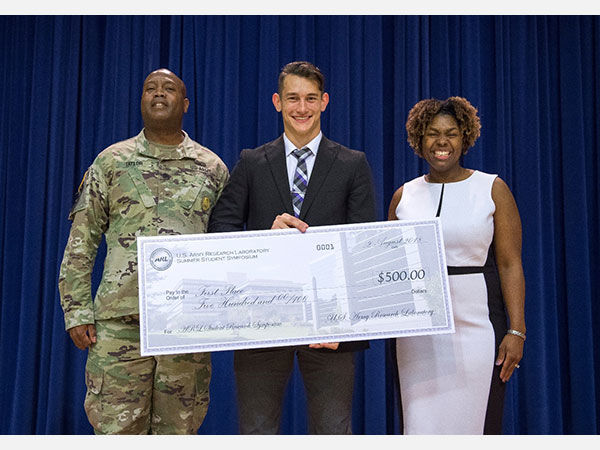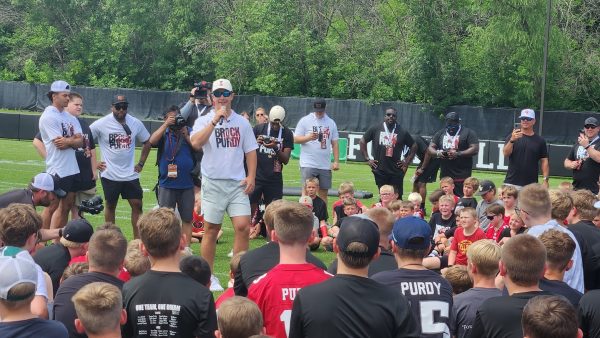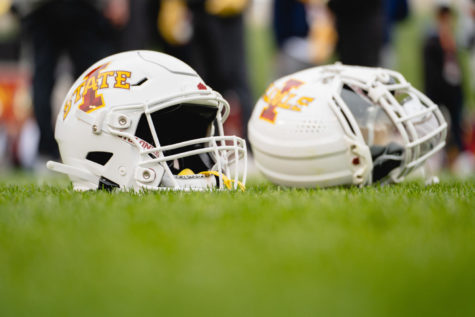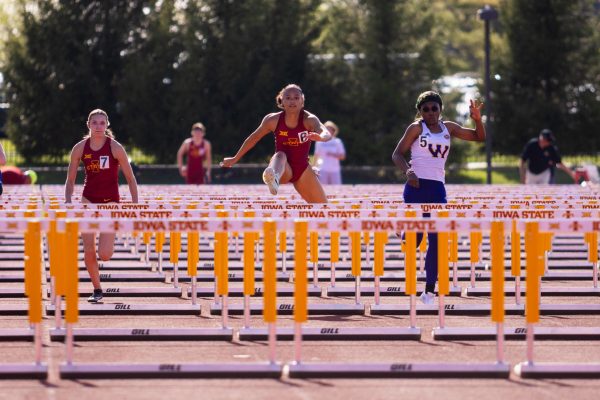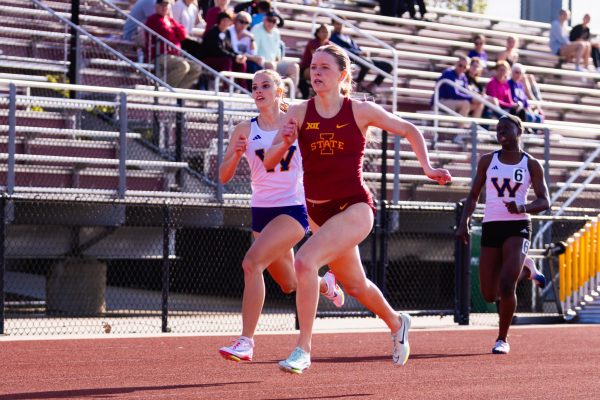Nikita Kozak: Work ethic on and off the ice
March 8, 2020
The list of Nikita Kozak’s accomplishments is extensive both on and off the ice.
The Cyclone Hockey goalie received many accolades in his time at Iowa State: Goldwater Scholar, Wallace E. Barron All-University Senior Award and a 3.95 GPA in mechanical engineering. And that’s only the beginning.
Kozak joined Cyclone Hockey his freshman year on its American Collegiate Hockey Association (ACHA) Division III team — now a Division II team, appearing in eight games as a freshman. The following year, he joined the Cyclone Hockey’s ACHA Division I team.
He had four appearances his sophomore year and six his junior year. During his senior year, Kozak was the starting goalie, making 1,037 total saves in 35 appearances. His 1.90 average goals against per game and save percentage 93.7 both rank in this season’s top 10 among ACHA Division I goalies.
“People like Nikita are rare, but you recognize them very quickly — even when they’re young,” said Jason Fairman, head coach and general manager of Cyclone Hockey.
Fairman is not the only person within Cyclone Hockey to recognize Kozak’s character. Blake Ramsey, long-time teammate and friend of Kozak’s, has a front row seat to Kozak’s daily life.
Ramsey and Kozak started playing hockey together around the age of 10. Throughout high school, they played on a local club hockey team — the Des Moines Capitals. After a short hiatus when Ramsey played for the U18 Iowa Wild, the two rejoined forces on the ice at Iowa State.
“He always works for what he wants to get,” Ramsey said. “He doesn’t stop until the job’s complete. His work ethic and determination really set him apart from others.”
Kozak will earn a bachelor’s degree in mechanical engineering with a minor in mathematics this spring.
Kozak, along with his parents and older sister, moved to the United States from Ukraine when he was 3 years old. During the immigration, Kozak received a toy car. This car, along with his parents being engineers, ended up sparking his interest in engineering.
“I was just fascinated by its ability to move itself,” Kozak said. “I grew up in a house with both my parents as engineers. I was always around people taking stuff apart and putting it back together and trying to figure out how. I intersected that with my interest in cars and started building my own remote-control cars, etc.”
Kozak said his parents did not push engineering on him. They guided him to understand what was important — education as a whole. Kozak said one of his family’s values is doing what you love and pursuing it. He chose engineering himself and ran with it.
His interest in engineering played a role in his choice to attend Iowa State. Other factors were the faculty, the support of the engineering program and proximity to home — he went to Waukee High School. Kozak also liked the aspect of being able to play hockey in addition to obtaining an education.
In the summer of 2017, Kozak studied abroad at Hochschule Mannheim University of Applied Sciences, a public university in Mannheim, Germany.
Upon his return in the fall later that year, Kozak reached out to Ming-Chen Hsu, associate professor of mechanical engineering at Iowa State, because he was looking for a research project. Hsu said he was impressed by Kozak’s resume.
Kozak also returned from Germany with the knowledge of how to use the finite element method, a method used by the graduate mechanical engineering students at Iowa State. Hsu said it is not taught in the undergraduate curriculum.
The knowledge of the method, among other factors, awed Hsu right away.
“He is really self-motivated to learn,” Hsu said. “I think that’s a really important quality that I saw.”
Hsu saw many examples of Kozak’s motivation. Kozak picked up a fluid dynamics textbook to start teaching himself to utilize in his research, as he had not yet been taught the subject formally. Hsu said it is a goal to not overwhelm the undergraduate too much, and Kozak took the learning into his own hands.
In the fall that he reached out to Hsu, Kozak joined the Computational Fluid–Structure Interaction (CFSI) Laboratory in Ames, Iowa, to perform undergraduate research. He has two first author publications from his research, one in the Journal of Mechanics and the other in the American Institute of Aeronautics and Astronautics (AIAA) Propulsion and Energy Forum. Kozak also presented at the 2019 AIAA Propulsion and Energy Forum.
“I’m glad to see him get all these accolades and recognition because he has worked hard and deserves it,” Ramsey said.
The U.S. Army Research Laboratory collaborates with Iowa State, as the university sends graduate students for internships to the laboratory — but Hsu said sending undergraduate students is rare. He said Iowa State recommended Kozak for the internship position. Kozak interviewed for the opportunity and was accepted. He spent the summer of 2018 and 2019 in Aberdeen Proving Ground, Maryland, at the laboratory. The bulk of his research revolved around gas turbine engines and combustion engineering of those engines.
“I think the most amazing part about him is the dedication,” Hsu said. “I think he takes things seriously, and it’s very easy for us to tell.”
Kozak’s research in 2018 earned a first-place prize at two separate symposiums. The first was at the 2018 Army Research Laboratory Symposium, with over 230 researchers. The other was at the 2018 U.S. Army Vehicle Technology Research Symposium, with over 30 researchers.
In 2019, Kozak again picked up two first-place finishes. The first was at the 2019 Army Research Laboratory Symposium out of more than 220 researchers. The second was at the 2019 Army Computational and Information Science Research Symposium out of more than 20 researchers.
Kozak also received a first-place prize at the 2019 IINSPIRE LSAMP Research Conference. He emerged as the winner from the group of eight selected researchers.
“It’s nice to see that he’s being dually rewarded for all of his hard work,” Fairman said.
During his summers, Kozak found time to stay in shape. Fairman said for the last three years, Kozak was one of the top-conditioned athletes in the testing before the season.
He was one of four Iowa State students to be named a 2019 Goldwater Scholar, a national award for academic achievement to recognize the future leaders in the fields of engineering, science and mathematics. The award commemorates former Sen. Barry G. Goldwater, who served in the U.S. Senate for 30 years.
Iowa State’s nominee for the 2019 Rhodes Scholarship was Kozak. The university is allotted only one nominee each year.
He gave a presentation at Harvard University in February 2020. Kozak presented the collaborative project in which he and another student used data science and machine learning to analyze the inventory management of a utility company’s sudden and random demands. He said the project is outside the realm of engineering but offered him some multidisciplinary work to add to his repertoire. Kozak is also a 2020 Stanford Knight-Hennessy Fellowship Finalist.
He is one of seven 2020 Wallace E. Barron All-University Senior Award recipients. The annual award honors Iowa State seniors for academic achievements among other qualities.
“The Iowa State University Alumni Association established this award in 1968 to recognize outstanding seniors who display high character, outstanding achievement in academics and university/community activities and promise for continuing these exemplary qualities as alumni,” according to the Iowa State University Alumni website.
Kozak became one of the 195 total winners, including this year’s recipients.
In addition to academics and athletics, Kozak periodically assists as a youth hockey coach in Iowa and Maryland, mainly during the summer months.
He plans to pursue a doctorate in mechanical engineering along with a master’s degree in computer science with a focus in artificial intelligence. His top five potential graduate schools are Brown University, Stanford University, Massachusetts Institute of Technology, University of California San Diego and University of Texas at Austin, in no particular order.
Someday, Kozak would like to have his own research team at a national laboratory. The eventual plan is to turn the research team into an entrepreneurial venture to accelerate the impact of the research. Kozak said he wants to focus on vehicle innovation to enable urban air transportation, revolutionizing the vehicles currently used and upgrading their propulsion systems, safety, reliability, comfort and everything in between.
Ramsey has enjoyed the time he’s spent with Kozak and watching Kozak’s progression over the years.
“I’m gonna miss him,” Ramsey said. “This is my last year playing with him forever, so it’s gonna be weird without him next year, but it’s been a heck of a ride.”

